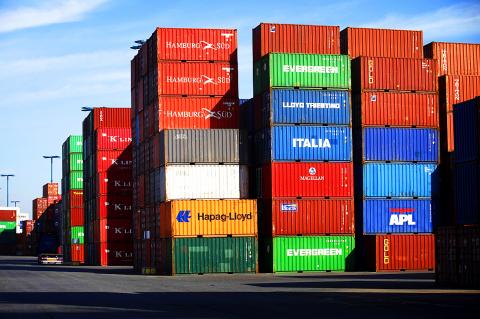Evergreen Marine Corp (長榮海運), the nation’s largest container shipping company, plans to charter seven new vessels with capacity of 14,000 twenty-foot equivalent units (TEU) to upgrade its fleet at lower unit costs.
However, the upgrade plan might not have a significant impact on the container shipper’s capacity, as the company is to gradually retire some of its old and smaller vessels with lower operating efficiency.
The seven vessels — owned by Sumitomo Corp, a leading integrated trading company in Japan — are scheduled to be delivered to Evergreen in 2016 and 2017, with a 10-year term of tenancy.

Photo: Bloomberg
“The decision fits into the company’s fleet replacement plan,” Evergreen Marine said in an announcement on the Taiwan Stock Exchange (TWSE).
With the world’s three-largest container shippers announcing plans to introduce a set of vessels with capacity above 10,000 TEUs, the trend to operate larger container ships to save unit costs has been confirmed.
Evergreen launched a plan last year to introduce more large vessels.
The company announced last year it will charter 10 container ships with capacity of 13,800 TEUs — built by Hyundai Heavy Industries — from Greek shipowner Enesel SA.
The container shipper has taken delivery of two of the 10 vessels since September last year, with the remaining eight to be delivered in the second half of the year.
However, Evergreen Marine said the plan would not increase supply in the container shipping industry significantly, as the company intends to replace some of its smaller vessels during the period by eliminating its self-owned ships or not extending the leasing contract of its chartered vessels.
Evergreen Group (長榮集團) vice chairman Bronson Hsieh (謝志堅) said last month that demand for this year on container shipping sector could rise on the back of global economic recovery. Evergreen Marine has also announced to implement a rate restoration program for routes from Far East and Indian Sub-Continent to Europe and the Mediterranean region by US$500 per TEU, or by US$1,000 per forty-foot equivalent unit (FEU).
The rate-hike plan, effective on Wednesday, reflects the company’s brighter outlook for this year. Hsieh said the company is considering joining the Green Alliance, also known as the CKYH alliance, to improve its competitiveness.
The Green Alliance comprises a group of several Asian container shipping companies, including Taiwan’s Yang Ming Marine Transport Corp (陽明海運), China Ocean Shipping (Group) Co (中遠集團) of China, Japan’s Kawasaki Kisen Kaisha Ltd — known as “K” Line — and Hanjin Shipping Co of South Korea. In the first three quarters of last year, Evergreen Marine posted a net loss of NT$2.19 billion (US$72.91 million), or NT$0.63 per share, its financial statement showed.
However, the container shipper might still post a profit for the whole of last year, thanks to its strong non-operating gains. Last month, the company announced that its full-owned subsidiary, Greencompass Marine SA (青標海運), disposed of containers worth NT$2.24 billion, which may lead the company to earn a total of NT$44.8 million, its stock exchange data showed.

In Italy’s storied gold-making hubs, jewelers are reworking their designs to trim gold content as they race to blunt the effect of record prices and appeal to shoppers watching their budgets. Gold prices hit a record high on Thursday, surging near US$5,600 an ounce, more than double a year ago as geopolitical concerns and jitters over trade pushed investors toward the safe-haven asset. The rally is putting undue pressure on small artisans as they face mounting demands from customers, including international brands, to produce cheaper items, from signature pieces to wedding rings, according to interviews with four independent jewelers in Italy’s main

Macronix International Co (旺宏), the world’s biggest NOR flash memory supplier, yesterday said it would spend NT$22 billion (US$699.1 million) on capacity expansion this year to increase its production of mid-to-low-density memory chips as the world’s major memorychip suppliers are phasing out the market. The company said its planned capital expenditures are about 11 times higher than the NT$1.8 billion it spent on new facilities and equipment last year. A majority of this year’s outlay would be allocated to step up capacity of multi-level cell (MLC) NAND flash memory chips, which are used in embedded multimedia cards (eMMC), a managed

Japanese Prime Minister Sanae Takaichi has talked up the benefits of a weaker yen in a campaign speech, adopting a tone at odds with her finance ministry, which has refused to rule out any options to counter excessive foreign exchange volatility. Takaichi later softened her stance, saying she did not have a preference for the yen’s direction. “People say the weak yen is bad right now, but for export industries, it’s a major opportunity,” Takaichi said on Saturday at a rally for Liberal Democratic Party candidate Daishiro Yamagiwa in Kanagawa Prefecture ahead of a snap election on Sunday. “Whether it’s selling food or

In the wake of strong global demand for AI applications, Taiwan’s export-oriented economy accelerated with the composite index of economic indicators flashing the first “red” light in December for one year, indicating the economy is in booming mode, the National Development Council (NDC) said yesterday. Moreover, the index of leading indicators, which gauges the potential state of the economy over the next six months, also moved higher in December amid growing optimism over the outlook, the NDC said. In December, the index of economic indicators rose one point from a month earlier to 38, at the lower end of the “red” light.